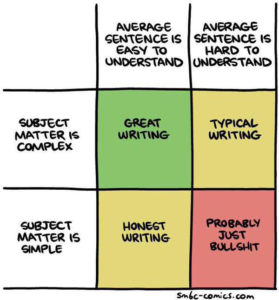
09 Feb What’s the Use of Utilize?
Language changes, words change, and the world of business is a significant change vector for the way we speak. As an example, somewhere in the last 5 years it has become acceptable to say “100 percent” out loud instead of “yes”. I suspect that in business, we needed a way to say “REALLY Yes” and statistics are convincing, so that became a kind of shorthand. (I still think it’s a bit amusing. There’s a chance if you say “100 per cent” to me in a meeting I might reply to you with “68.5%” when you ask me a yes/no question.)
But the one thing that really grinds my gears, the one thing that I will visibly wince at, the one thing that will make me want to put your resume straight in the trash is the word “Utilize”.
This word is a three syllable word that in almost all contexts, is just another way to say “use”.
I know, I know, it’s irrational. I know I should just let business language evolve along its own weird path and not be annoyed. But people choose “utilize” over “use” because they are trying to increase the number of syllables they use so they can sound fancy and professional. They are trying to increase the syllable to meaning ratio, and it doesn’t make you sound smart. It just adds pomp and confusion.
Utilize and Use previously had distinct meanings – to Use something was to use an object for the purpose for which it was intended. You can use a butter knife to spread butter on bread. That’s it’s use.
Utilize, on the other hand meant “to make use of” – as in to do something with the object that it wasn’t intended to be used for. You can utilize a slide rule to spread butter on bread. It’s not it’s actual intended use, you’re improvising.
(Stephen Heard has a great, much more detailed breakdown of the current state of Use vs Utilize for those of you who want to dig into the weeds, but the upshot is that nowadays the two words are basically just synonyms for each other.)
But geez people, you don’t utilize Microsoft Outlook. You use it. You don’t “utilize effective communication skills in the office” – you use them. Clean, simple language with less syllables makes everybody’s lives easier.

This Use/Utilize conundrum happens with software, too.
People are utilizing a critical spreadsheet to manage all their information – when it really should be in a dedicated business system. People utilize Outlook as their Customer Management System. Wherever a system has high utility value, you’ll find improvised solutions that weren’t it’s intended use. With Enterprise Software, this is often because you are limited in the tools you have access to, so you have to build the customer register in an Excel Spreadsheet. Excel’s intended use was statistical analysis of data – but most people utilize it to make lists.
If we’re going to improve business agility, and our organization’s ability to respond flexibly to change, we need to bring platforms into the enterprise that are designed to deal with the complexities of modern business. That react to change, and allow people to build purpose built systems. Let’s not settle for utilizing legacy systems and wrestling spreadsheets into pseudo-systems. A no-code platform designed to build apps can help.
(Oh, and if we could all agree to just stop writing “Utilize” that would be great, too. 100 percent!)




Sorry, the comment form is closed at this time.